人教版Book1 Units1-2 晨背晚读系列
- 格式:doc
- 大小:47.08 KB
- 文档页数:3

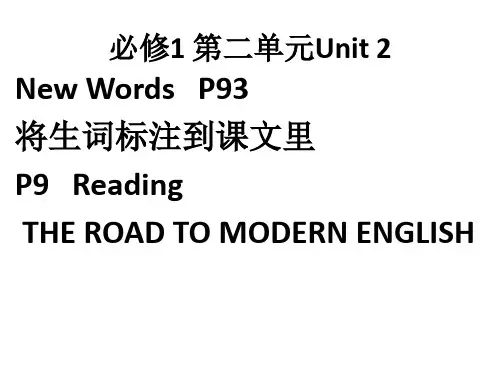
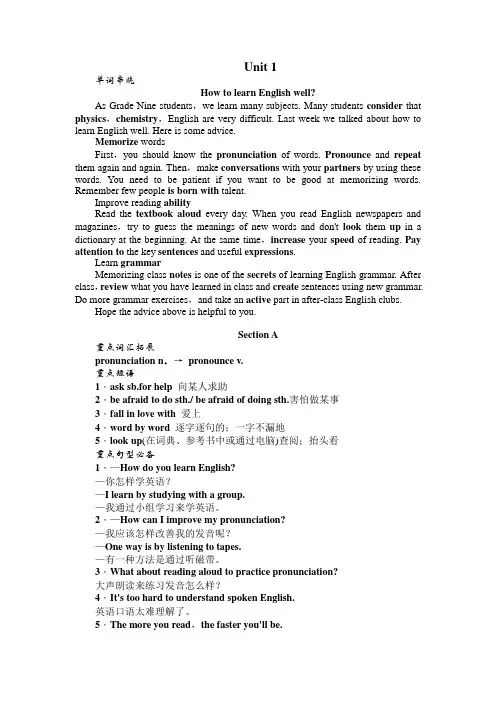
Unit 1单词串烧How to learn English well?As Grade Nine students,we learn many subjects. Many students consider that physics,chemistry,English are very difficult. Last week we talked about how to learn English well. Here is some advice.Memorize wordsFirst,you should know the pronunciation of words. Pronounce and repeat them again and again. Then,make conversations with your partners by using these words. You need to be patient if you want to be good at memorizing words. Remember few people is born with talent.Improve reading abilityRead the textbook aloud every day. When you read English newspapers and magazines,try to guess the meanings of new words and don't look them up in a dictionary at the beginning. At the same time,increase your speed of reading. Pay attention to the key sentences and useful expressions.Learn grammarMemorizing class notes is one of the secrets of learning English grammar. After class,review what you have learned in class and create sentences using new grammar. Do more grammar exercises,and take an active part in after-class English clubs.Hope the advice above is helpful to you.Section A重点词汇拓展pronunciation n.→pronounce v.重点短语1.ask sb.for help 向某人求助2.be afraid to do sth./ be afraid of doing sth.害怕做某事3.fall in love with 爱上4.word by word 逐字逐句的;一字不漏地5.look up(在词典、参考书中或通过电脑)查阅;抬头看重点句型必备1.—How do you learn English?—你怎样学英语?—I learn by studying with a group.—我通过小组学习来学英语。

人教精通版小学英语六年级上册unit1课文单词音频+知识点梳理+单元练习【预习必备】人教精通版小学英语六年级上册Unit1课文单词音频+知识点梳理+单元练习▲点右上方绿标即可收听Lesson 1 00:00--01:26Lesson 2 01:26--03:09Lesson 3 03:09--04:20Lesson 4 04:20--05:32Lesson 5 05:32--06:23Lesson 6 06:23--12:46Lesson 1Just read and talk情景详解:露西给李妍发送一封电子邮件,她向李妍详细介绍了她的日常生活和学习情况,她希望李妍给她回复一封电子邮件。
Dear Li Yan,亲爱的李妍My name is Lucy White.我叫露西·怀特I m from London. I m twelve. I m in Primary Six.我来自伦敦我十二岁我上小学六年级Now let me tell you about my daily life.现在我来告诉你你一些我的日常生活I get up at 7:30 in the morning.我早上七点半起床I have breakfast at 8:00.我八点吃早餐I go to school at 8:30.我八点半上学School begins at 9:00.我九点钟开始上课We have seven subjects.我们有七门课程They are English, maths, Chinese, science, PE, art and music.分别是英语数学中文科学体育艺术音乐I have lunch at school at 11:45.我十一点四十五在学校吃午餐School is over at 3:30 in the afternoon. I go home at 4:00.我下午三点半放学我四点回家I have dinner at about 7:00 in the evening.我晚上七点吃晚餐After dinner, I watch TV for 30 minutes and do some reading.晚餐之后我看三十分钟电视看会儿书I go to bed at about 9:30.我晚上九点半上床睡觉How about you and your family?你和你的家人呢Can you tell me by email?你能写邮件告诉我吗Best wishes,最好的祝福送给你Lucy露西Lesson 2I have breakfast at 7:30 in the morning.我在早晨七点半吃早餐。
![Book1Unit2[精选文档]](https://uimg.taocdn.com/3d2c926311661ed9ad51f01dc281e53a58025106.webp)
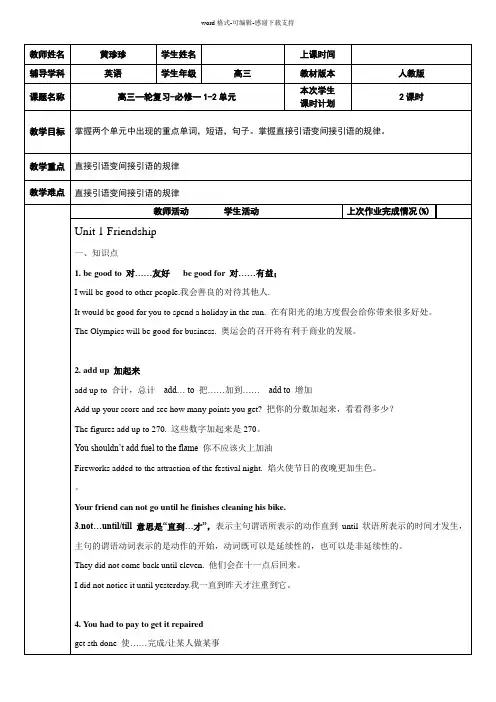
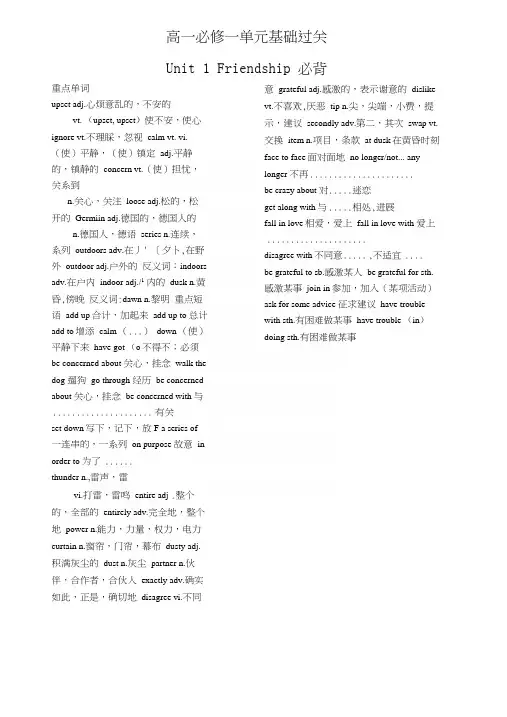
高一必修一单元基础过关Unit 1 Friendship 必背重点单词upset adj.心烦意乱的,不安的vt. (upset, upset)使不安,使心ignore vt.不理睬,忽视calm vt. vi.(使)平静,(使)镇定adj.平静的,镇静的concern vt.(使)担忧,关系到n.关心,关注loose adj.松的,松开的Germiin adj.徳国的,徳国人的n.德国人,德语series n.连续,系列outdoors adv.在丿' [夕卜,在野外outdoor adj.户外的反义词:indoors adv.在户内indoor adj./1内的dusk n.黄昏,傍晚反义词:dawn n.黎明重点短语add up合计,加起来add up to 总计add to增添calm (...)down (使)平静下来have got (o不得不;必须be concerned about 关心,挂念walk the dog 遛狗go through 经历be concerned about 关心,挂念be concerned with 与..................... 有关set down写下,记下,放F a series of 一连串的,一系列on purpose 故意in order to 为了 ......thunder n.,雷声,雷vi.打雷,雷鸣entire adj .整个的,全部的entirely adv.完全地,整个地power n.能力,力量,权力,电力curtain n.窗帘,门帘,幕布dusty adj.积满灰尘的dust n.灰尘partner n.伙伴,合作者,合伙人exactly adv.确实如此,正是,确切地disagree vi.不同意grateful adj.感激的,表示谢意的dislike vt.不喜欢,厌恶tip n.尖,尖端,小费,提示,建议secondly adv.第二,其次swap vt.交换item n.项目,条款at dusk在黄昏时刻face to face面对面地no longer/not... any longer 不再......................be crazy about 对..... 迷恋get along with与..... 相处,进展fall in love相爱,爱上fall in love with 爱上.....................disagree with不同意..... ,不适宜.... be grateful to sb.感激某人be grateful for sth.感激某事join in参加,加入(某项活动)ask for some advice 征求建议have trouble with sth.有困难做某事have trouble (in)doing sth.有困难做某事重点句型1 ・ While walking the dog, you were careless and it got loose and was hit by a car.当遛狗时,你是粗心的,它松开了并被汽车撞了。
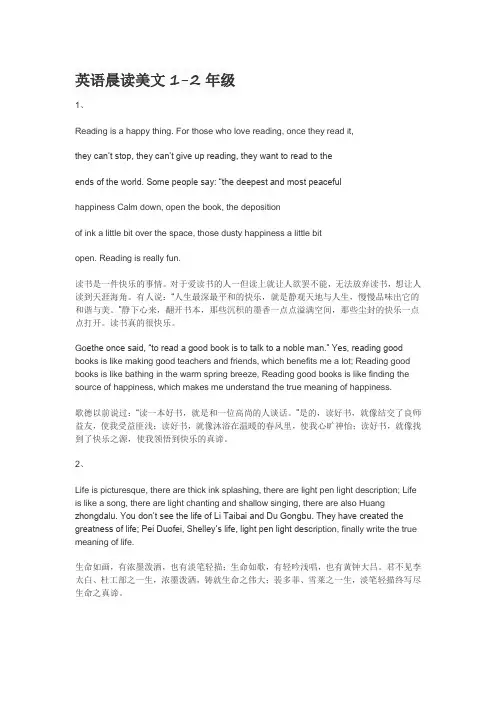
英语晨读美文1-2年级1、Reading is a happy thing. For those who love reading, once they read it,they can’t stop, they can’t give up reading, they want to read to theends of the world. Some people say: “the deepest and most peacefulhappiness Calm down, open the book, the depositionof ink a little bit over the space, those dusty happiness a little bitopen. Reading is really fun.读书是一件快乐的事情。
对于爱读书的人一但读上就让人欲罢不能,无法放弃读书,想让人读到天涯海角。
有人说:“人生最深最平和的快乐,就是静观天地与人生,慢慢品味出它的和谐与美。
”静下心来,翻开书本,那些沉积的墨香一点点溢满空间,那些尘封的快乐一点点打开。
读书真的很快乐。
Go ethe once said, “to read a good book is to talk to a noble man.” Yes, reading good books is like making good teachers and friends, which benefits me a lot; Reading good books is like bathing in the warm spring breeze, Reading good books is like finding the source of happiness, which makes me understand the true meaning of happiness.歌德以前说过:“读一本好书,就是和一位高尚的人谈话。
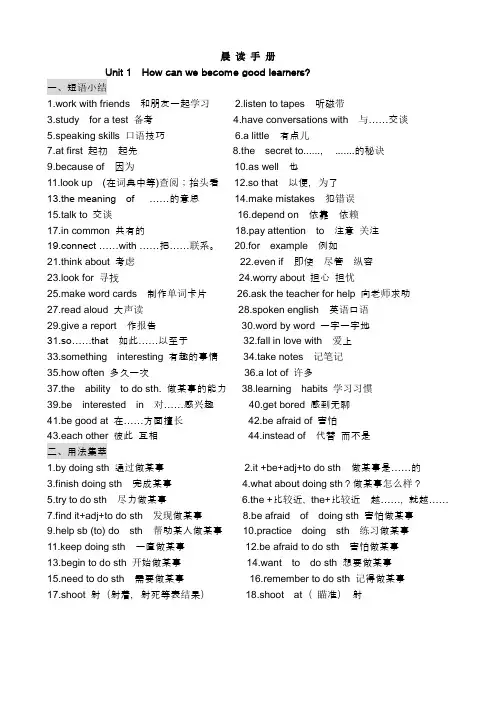
晨读手册Unit 1 How can we become good learners?一、短语小结1.work with friends 和朋友一起学习2.listen to tapes 听磁带3.study for a test 备考4.have conversations with 与……交谈5.speaking skills 口语技巧6.a little 有点儿7.at first 起初起先8.the secret to......, .......的秘诀9.because of 因为10.as well 也11.look up (在词典中等)查阅;抬头看12.so that 以便,为了13.the meaning of ……的意思14.make mistakes 犯错误15.talk to 交谈16.depend on 依靠依赖17.in common 共有的18.pay attention to 注意关注19.connect ……with ……把……联系。
20.for example 例如21.think about 考虑22.even if 即使尽管纵容23.look for 寻找24.worry about 担心担忧25.make word cards 制作单词卡片26.ask the teacher for help 向老师求助27.read aloud 大声读28.spoken english 英语口语29.give a report 作报告30.word by word 一字一字地31.so……that 如此……以至于32.fall in love with 爱上33.something interesting 有趣的事情34.take notes 记笔记35.how often 多久一次36.a lot of 许多37.the ability to do sth. 做某事的能力38.learning habits 学习习惯39.be interested in 对……感兴趣40.get bored 感到无聊41.be good at 在……方面擅长42.be afraid of 害怕43.each other 彼此互相44.instead of 代替而不是二、用法集萃1.by doing sth 通过做某事2.it +be+adj+to do sth 做某事是……的3.finish doing sth 完成某事4.what about doing sth?做某事怎么样?5.try to do sth 尽力做某事6.the +比较近,the+比较近越……,就越……7.find it+adj+to do sth 发现做某事8.be afraid of doing sth 害怕做某事9.help sb (to) do sth 帮助某人做某事10.practice doing sth 练习做某事11.keep doing sth 一直做某事12.be afraid to do sth 害怕做某事13.begin to do sth 开始做某事14.want to do sth 想要做某事15.need to do sth 需要做某事16.remember to do sth 记得做某事17.shoot 射(射着,射死等表结果)18.shoot at(瞄准)射三、精选例句1. What about doing sth ?=How about doing sth.?例:What about listening to tapes?=Why not listen to tapes?2. by的用法a. 介词 prep. (指交通等)乘;例:The man came by bus. 那人是坐公共汽车来的。
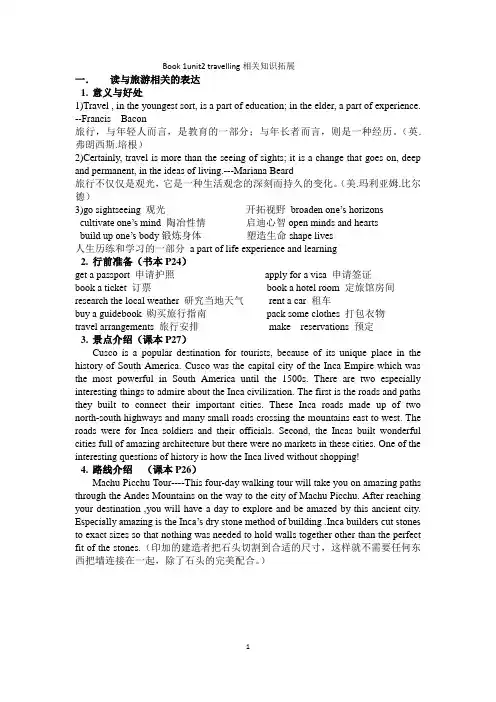
Book 1unit2 travelling相关知识拓展一.读与旅游相关的表达1.意义与好处1)Travel , in the youngest sort, is a part of education; in the elder, a part of experience. --Francis Bacon旅行,与年轻人而言,是教育的一部分;与年长者而言,则是一种经历。
(英.弗朗西斯.培根)2)Certainly, travel is more than the seeing of sights; it is a change that goes on, deep and permanent, in the ideas of living.---Mariana Beard旅行不仅仅是观光,它是一种生活观念的深刻而持久的变化。
(美.玛利亚姆.比尔德)3)go sightseeing 观光开拓视野broaden one’s horizons cultivate one’s mind 陶冶性情启迪心智open minds and heartsbuild up one’s body锻炼身体塑造生命shape lives人生历练和学习的一部分 a part of life experience and learning2.行前准备(书本P24)get a passport 申请护照apply for a visa 申请签证book a ticket 订票book a hotel room 定旅馆房间research the local weather 研究当地天气rent a car 租车buy a guidebook 购买旅行指南pack some clothes 打包衣物travel arrangements 旅行安排make reservations 预定3.景点介绍(课本P27)Cusco is a popular destination for tourists, because of its unique place in the history of South America. Cusco was the capital city of the Inca Empire which was the most powerful in South America until the 1500s. There are two especially interesting things to admire about the Inca civilization. The first is the roads and paths they built to connect their important cities. These Inca roads made up of two north-south highways and many small roads crossing the mountains east to west. The roads were for Inca soldiers and their officials. Second, the Incas built wonderful cities full of amazing architecture but there were no markets in these cities. One of the interesting questions of history is how the Inca lived without shopping!4.路线介绍(课本P26)Machu Picchu Tour----This four-day walking tour will take you on amazing paths through the Andes Mountains on the way to the city of Machu Picchu. After reaching your destination ,you will have a day to explore and be amazed by this ancient city. Especially amazing is the Inca’s dry stone method of building .Inca builders cut stones to exact sizes so that nothing was needed to hold walls together other than the perfect fit of the stones.(印加的建造者把石头切割到合适的尺寸,这样就不需要任何东西把墙连接在一起,除了石头的完美配合。
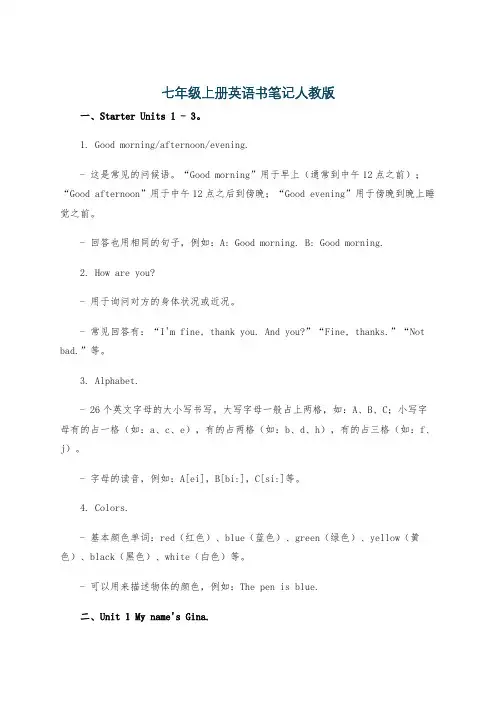
七年级上册英语书笔记人教版一、Starter Units 1 - 3。
1. Good morning/afternoon/evening.- 这是常见的问候语。
“Good morning”用于早上(通常到中午12点之前);“Good afternoon”用于中午12点之后到傍晚;“Good evening”用于傍晚到晚上睡觉之前。
- 回答也用相同的句子,例如:A: Good morning. B: Good morning.2. How are you?- 用于询问对方的身体状况或近况。
- 常见回答有:“I'm fine, thank you. And you?”“Fine, thanks.”“Not bad.”等。
3. Alphabet.- 26个英文字母的大小写书写。
大写字母一般占上两格,如:A、B、C;小写字母有的占一格(如:a、c、e),有的占两格(如:b、d、h),有的占三格(如:f、j)。
- 字母的读音,例如:A[ei],B[bi:],C[si:]等。
4. Colors.- 基本颜色单词:red(红色)、blue(蓝色)、green(绿色)、yellow(黄色)、black(黑色)、white(白色)等。
- 可以用来描述物体的颜色,例如:The pen is blue.二、Unit 1 My name's Gina.1. Introducing oneself.- “I'm...”和“My name is...”都可以用来介绍自己的名字。
例如:I'm Tom. = My name is Tom.- 在英语中,名字的书写顺序是名在前,姓在后。
2. Asking for someone's name.- “What's your name?”是最常见的询问对方名字的句子。
- 其回答可以是:My name is...或者I'm...3. Nice to meet you.- 用于初次见面时打招呼,回答是“Nice to meet you, too.”4. Telephone numbers.- 数字0 - 9的英语表达:zero,one,two,three,four,five,six,seven,eight,nine。
Book 1 Unit 2 English around the worldPart 1. ReadingTHE ROAD TO MODERN ENGLISHAt the end of the 16th century, about five to seven million people spoke English. Nearly all of them lived in England. Later in the next century, people from England made voyage s to conquer other parts of the world and because of that, English began to be spoken in many other countries. Today, more people speak English as their first, second or foreign language than ever before.Native English speakers can understand each other even if they don’t speak the same kind of English. Look at this example:British Betty: Would you like to see my flat?American Amy: Yes, I’d like to come up to your apartment.So why has English changed over time? Actually all languages change and develop when culture s meet and communicate with each other. At first the English spoken in England between about AD 450 and 1150 was very different from the English spoken today. It was base d more on German than the English we speak at present. Then gradually between about AD 800 and 1150, English became less like German because those who rule d England spoke first Danish and later French. These new settler s enrich ed the English language and especially its vocabulary. So by the 1600’s Shakespea re was able to make use of a wide r vocabulary than ever before. In 1620 some British settlers move d to America. Later in the 18th century some British people were taken to Australia too. English began to be spoken in both countries.Finally by the 19th century the language was settled. At that time two big changes in English spelling happened: first Samuel Johnson wrote his dictionary and later Noah Webster wrote The American Dictionary of the English Language. The latter gave a separate identity to American English spelling.English now is also spoken as a foreign or second language in South Asia. For example, India has a very large number of fluent English speakers because Britain ruled India from 1765 to 1947. During that time English became the language for government and education. English is also spoken in Singapore and Malaysia and countries in Africa such as South Africa. Today the number of people learning English in China is increasing rapidly. In fact, China may have the largest number of English learners. Will Chinese English develop its own identity? Only time will tell.Part 2. Using LanguageSTANDARD ENGLISH AND DIALECTSWhat is standard English? Is it spoken in Britain, the US, Canada, Australia, India and New Zealand? Believe it or not, there is no such thing as standard English. Many people believe the English spoken on TV and the radio is standard English. This is because in the early days of radio, those who report ed the news were expect ed to speak excellent English. However, on TV and the radio you will hear differences in the way people speak.When people use word s and expression s different fro m “standard language”, it is called a dialect. American English has many dialects, especially the midwestern, southern, African American and Spanish dialects. Even in some parts of the USA, two people from neighbour ing towns speak a little differently. American English has so many dialects because people have come from all over the world.Geography also plays a part in making dialects. Some people who live in the mountains of the eastern USA speak with an older kind of English dialect. When Americans moved from one place to another, they took their dialects with them. So people from the mountains in the southeastern USA speak with almost the same dialect as people in the northwestern USA. The USA is a large country in which many different dialects are spoken. Although many Americans move a lot, they still recognize and understand each other’s dialects.Part 3. Reading and speakingAmy and her American friends are visiting London. They plan to visit Amy’s aunt and decide to go there by underground, but cannot find the nearest underground station. So she asks direction s and then tells her friends. Read the dialogue and circle the words that mean the same.AMY: Excuse me, Ma’ma. Could you tell me where the nearest subways is?LADY: Er...the underground? Well, go round the corner on your left-hand side, straight on and cross two streets. It’ll be on your right-hand side.AMY: Thanks so much.FRIENDS: What did she say, Amy?AMY: She told us to go around the corner on the left and keep going straight for two block s. The subway will be on our right.。
Starter Unit1Good Morning! Units1—3【重点单词】good/gud/adj.好的morning/'mɔ:niŋ/n.早晨;上午Good morning!早上好!hi/hai/interj.(用于打招呼)嗨;喂hello/hə'ləu/interj.你好;喂afternoon/,a:ftə'nu:n/n.下午Good afternoon!下午好!evening/'i:vniŋ/n.晚上;傍晚Good evening!晚上好!how/hau/adv.怎样;如何are/a:/v.是you/ju:/pron.你;你们How are you?你好吗?I/ai/pron.我am/æm/v.是fine/fain/adj.健康的;美好的thanks/θæŋks/interj.&n.感谢;谢谢OK/əu'kei/interj.&adv.好;可以what/wɔt/pron.&adj.什么is/iz/v.是this/ðis/pron.这;这个in/in/prep.(表示使用语言、材料等)用;以English/'iŋgliʃ/n.英语adj.英格兰的;英语的in English用英语map/mæp/n.地图cup/kʌp/n.杯子ruler/'ru:lə/n.尺;直尺pen/pen/n.笔;钢笔orange/'ɔrindʒ/n.橙子jacket/'dʒækit/n.夹克衫;短上衣key/ki:/n.钥匙quilt/kwilt/n.被子;床罩it/it/pron.它a/ə/art.(用于单数可数名词前)一(人、事、物) that/ðæt/pron.那;那个spell/spel/v.用字母拼;拼写please/pli:z/interj.(用于客气地请求或吩咐)请color/'kʌlə/n.(=colour)颜色red/red/adj.&n.红色(的)yellow/'jeləu/adj.&n.黄色(的)green/gri:n/adj.&n.绿色(的)blue/blu:/adj.&n.蓝色(的)black/blæk/adj.&n.黑色(的)white/wait/adj.&n.白色(的)purple/'pə:pl/adj.&n.紫色(的)brown/braun/adj.&n.棕色(的);褐色(的)the/ði;ðə/art.指已提到或易领会到的人或事now/nau/adv.现在;目前see/si:/v.理解;明白can/kæn/modal v.能;会say/sei/v.说;讲my/mai/pron.我的知识点:1.短语归纳:good morning早上好good afternoon下午好good evening晚上好name list名单an English name英文名字2.必背典句:(1)Good morning,Alice!早上好,艾丽斯!(2)Good afternoon!下午好!(3)Hi,Bob!你好,鲍勃!(4)Hello,Frank!你好,弗兰克!(5)Good evening晚上好!(6)—How are you?你好吗?—I’m fine,thanks.How are you?我很好,谢谢。
Unit 2 I think that mooncakes are delicious!Section A重点单词✍朗读下列单词。
1. *mooncake /'mu:nkeɪk/ n. 月饼2. *lantern /'læntə (r)n/ n. 灯笼3. stranger /'streɪndʒə (r)/ n. 陌生人4. relative /'relətɪv/ n. 亲属;亲戚5. *pound /paʊnd/ n. 磅(重量单位);英镑6. *folk /fəʊlk/ adj. 民间的;民俗的7. *goddess /'gɒdes/,/'gɑ:dəs/ n. 女神8. whoever /hu:'evə( r)/ pron. 无论谁;不管什么人9. steal /sti:l/ v. 偷;窃10. lay /leɪ/ v. 放置;安放;产(卵);下(蛋)11. *dessert /dɪ’zɜ:(r)t/ n.(饭后)甜点;甜食12. *garden /'gɑ:(r)dn/ n. 花园;园子13. tradition /trə'dɪʃn/ n. 传统14. admire /əd’maɪə (r)/ v. 欣赏;仰慕15. *tie /taɪ/ n. 领带v. 捆;束✍朗读下列变形的单词1. lay—laid (过去式)—laid (过去分词)2. tradition—traditional (adj.)3. fly—flew (过去式)—flown(过去分词)4. shoot—shot (过去式)—shot(过去分词)5. steal—stole (过去式)—stolen (过去分词)6. strange—stranger (n.)7. relation—relative (adj.)8. tie—tied (过去式)—tying (现在分词)重点短语✍朗读下列短语1. put on增加(体重);发胖= increase2. sound like…听起来像……3. the hottest month of the year一年中最热的月份4. from…to…从……到…… = from…until5. be similar to和……相似6. throw…at…朝……扔……7. wash away冲洗掉8. in the shape of…以……的形状9. carry sth. to sb.把某物带给某人10. shoot down射掉11. plan to do sth.计划做某事=be going to do sth.12. refuse to do sth.拒绝做某事=turn down to do sth.13. fly up to…飘向……14. call out one's name to…对着……喊出某人的名字15. lay out摆开;布置16. share…with…和……分享……17. come back回来= be /get back = return18. give sth. to sb.给某人某物=give sb. sth.19. take sb. out for dinner 带某人出去吃晚饭=eat out with sb.20. help (to) do sth. 帮助做某事=help with sth.重点句子✍朗读下列句子。
Unit 1 How can we become good learners?Section A重点单词✍朗读下列单词。
1. *textbook /’tekstbʊk/ n. 教科书;课本2. conversation /ˌkɒnvə’seɪʃn/,/ˌkɑ:nvər’seɪʃn/n. 交谈;谈话3. aloud /☯’la☺d/ adv. 大声地;出声地4. *pronunciation /prəˌnʌnsɪ’eɪʃn/ n. 发音;读音5. *sentence /’sentəns/ n. 句子6. patient /’peɪʃnt/ adj. 有耐心的n. 病人7. expression /ɪk’spreʃn/ n. 表达(方式);表示表情8. discover /’dɪskʌvə (r)/ v. 发现;发觉9. secret /’si:krət/ n. 秘密;adj. 秘密的;保密的10. *grammar /’græmə (r)/ n. 语法11. repeat /ri’pi:t/ v. 重复;重做12. *note /nəʊt/ n. 笔记;记录v. 注意;指出13. *pal /pæl/ n. 朋友;伙伴14. *physics /’fɪzɪks/ n. 物理;物理学15. *chemistry /’kemɪstrɪ/ n. 化学16. memorize /'memɪstrɪ/ v.记忆;记住17. *pattern /'pætn;'pætərn/ n. 模式;方式✍朗读下列变形的单词1. patient—patience (n. 耐心)—patiently(adv.)2. memory—memorize (v.)3. discover—discovery (n.)4. express—expression (n.)—expressive(adj.)5. conversation—conversational(adj.)6. physics—physical(adj.)7. chemist—chemistry(n.)—chemical(adj.)重点短语✍朗读下列短语1. make word cards制作单词卡片2. read the textbook读教科书3. listen to tapes听磁带4. ask sb. for… 向某人寻求……;向某人索要……5. study for a test为考试做准备;备考6. have conversations with sb.和某人谈话=talk to sb.7. at first起初,起先8. a little nervous有点儿紧张=kind of nervous9. give a report做报告10. take notes记/做笔记11. word by word逐词地12. so…that如此……以至于13. write emails to sb.给某人写电子邮件14. repeat out loud大声重复15. be afraid to do sth. 害怕做某事=be afraid of doing sth.16. because of由于;因为=thanks to17. fall in love with爱上18. a piece of cake小菜一碟19. look up(在词典、参考书中或通过电脑)查阅;抬头看20. so that以便= in order that重点句子✍朗读下列句子。